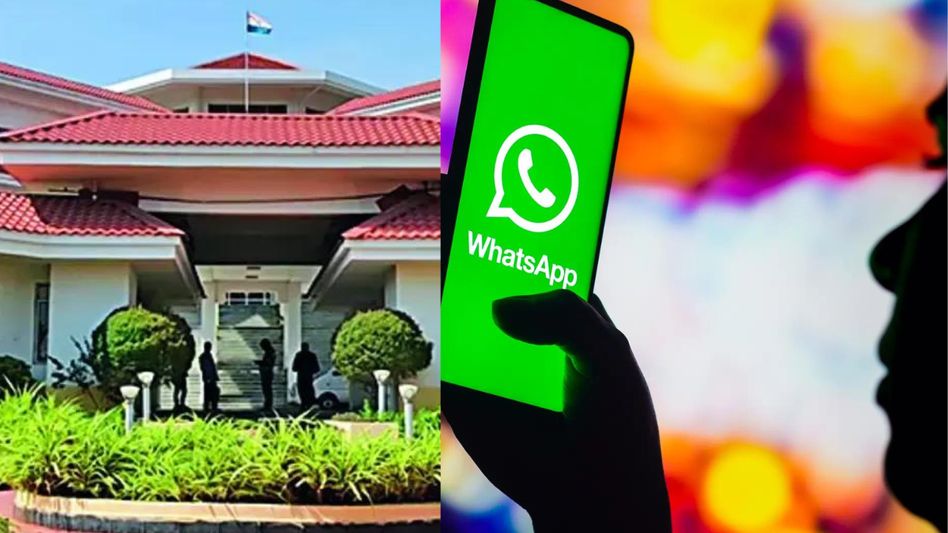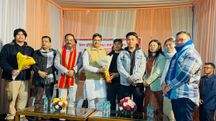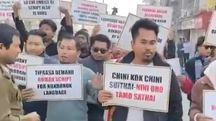Tripura high court grants interim relief to WhatsApp over CM's fake resignation letter circulation case
The Tripura High Court had granted interim relief to WhatsApp on the circulation of the fake resignation letter of Tripura CM Manik Saha, the next hearing is listed for December 5, 2023.
 Tripura high court grants interim relief to WhatsApp over CM's fake resignation letter circulation case
Tripura high court grants interim relief to WhatsApp over CM's fake resignation letter circulation caseA division bench led by Chief Justice Aparesh Kumar Singh of the Tripura High Court granted interim relief to the instant messaging platform WhatsApp LLC.
They have put a hold on an order issued by the Trial Court. The lower Court had instructed the platform's authorities to disclose the identity of the "originator" of a chat that included a fabricated resignation letter attributed to Tripura Chief Minister Dr Manik Saha.
Sources close to Tripura Police said that on May 25, a candidate of the Tipra Motha (TMP) party who fought the 2023 election but lost, had a post shared on her Facebook page.
“The post contained a screenshot of a fabricated resignation letter dated May 22, purportedly signed by Chief Minister Saha. The accompanying comment roughly translates to, "What does the future hold for them? There might be another change this time.
However, the Tipra Motha leader said that she does not personally manage her Facebook page. Instead, a member of her IT team was responsible for sharing the mentioned post. According to Tripura Police's investigating officer, the post in question was a screenshot from a WhatsApp group named "Aamader Mukkhomontri," which translates to "Our Chief Minister" in Bengali”, said Police.
Also Read: Supreme Court Collegium recommend two judicial officers as Judges for Tripura High Court
The fabricated post gained rapid traction, ultimately capturing the attention of ruling BJP workers who lodged a formal complaint at the New Capital Complex Police Station in Agartala on May 25, even though the post had already been removed.
Subsequently, an FIR was filed, invoking sections 468 (pertaining to forgery for fraudulent purposes), 469 (relating to forgery with intent to damage reputation), 471 (pertaining to the use of forged documents as genuine), 500 (imposing penalties for defamation), 504 (intentional insult with the aim of inciting breach of peace), and 120B (the penalty for criminal conspiracy) of the Indian Penal Code, alongside Section 66D (imposing penalties for cheating through personating using computer resources) of the Information Technology (IT) Act.
After the case went to West Tripura District and Session court, the court directed What’s App to disclose the identification of the first originator of this fake resignation letter. However the What’s app said they can’t reveal the first originator because of end-to-end encryption.
Later, the social media platform on September 22 filed a writ petition with the High Court of Tripura.
After hearing the case the High Court said it appears that the learned Trial Court has not specifically dealt with the issue relating to the extent of the threat to the public order as contemplated under Rule 4(2) as regards the prayer for disclosure of the first originator of the message only after 2(two) days of the institution of FIR. Reference is made to the decision in the case of Justice K.S. Puttaswamy (Retd.) & Anr. Vs. Union of India & Ors., reported in 2017) 10 SCC 1 on Right to Privacy. As such, the petitioner has been able to make out a case of interim relief"
The writ petition has questioned the vires of the Information Technology (Intermediary Guidelines and Digital Media Ethics Code) Rules 2021, apart from laying down a challenge to the impugned order dated 27th May 2023, passed in case No. 2023 NCC 044 by the learned Court No 6, First Class, Judicial Magistrate Agartala, West Tripura.
Senior counsel Mukul Rohatgi who represented WhatsApp LLC in the case cited an order dated 9th May 2022 passed by the Apex Court, in a batch of Writ Petition(s)(Civil) No(s). 799/2020 in Skand Bajpai and anr., Vs. Union of India & Ors., whereby further proceedings pending before the High Court in respect of the challenge to the instant Rules of 2021 have stayed.
The senior Advocate submitted before that Court that Rule 4(2) of the I.T.Rules 2021 prescribes the conditions under which such a judicial order can be issued by a Court of competent jurisdiction upon a significant social media intermediary for disclosing the first originator of the message. The provision thereto indicates that such an order shall only be passed, for the purposes of prevention, detection, investigation, prosecution or punishment of an offence relating to the sovereignty and integrity of India, the security of the State, friendly relations with foreign States, or public order, or of incitement to an offence relating to the above or in relation with rape, sexually explicit material or child sexual abuse material, punishable with imprisonment for a term of not less than five years. The second provision further provides that no order shall be passed in cases where other less intrusive means are effective in identifying the originator of the information.
"Learned Sr. counsel for the petitioner submits that no grounds of public order or imminent threat to public order have been made out in the application made by the investigating officer on 27th May 2023 (Annexure-20 to the writ petition) nor has the learned Judicial Magistrate in the impugned order of the same date referred to any such tangible threat to public order which requires invocation of Rule 4(2) to direct the petitioner to disclose the first originator of the alleged fake content", the Court order further reads”, the order reads.
Advocate General of Tripura SS Dey, on the other hand, objected to the interim relief sought by the petitioner stating that the petitioner being an intermediary does not have a locus standing to object to the disclosure it was asked to make by the Trial court.
"Learned senior counsel for the petitioner, therefore, submits that the invocation of Rule 4(2) by the learned Court at the instance of the investigating agency right 2(two) days after the institution of the FIR is without recording proper satisfaction as to the threat of public order, if any, relating to the alleged offence. As such, he prays that an interim protection may be granted.
SS Dey learned Advocate General assisted by Mr S. Shosh, learned Additional Public Prosecutor, appearing for the state respondent, has objected to the interim prayer. He submits that the petitioner being an intermediary Under the I.T. Act and the 2021 Rules framed thereunder does not have any locus standing to object to the disclosure of the first originator of the message as per directions of the learned 'Trial Court. None of the accused persons has approached this Court objecting to such disclosure. Upon consideration of the rival submission of the parties and the relevant Rule 4(2) of the Intermediary Rules 2021 and after going through the application of the Investigating Agency dated 27.05.2023”, it further reads adding that the case is next listed for December 05.
Copyright©2026 Living Media India Limited. For reprint rights: Syndications Today









